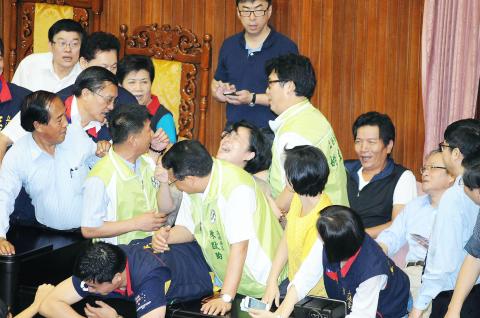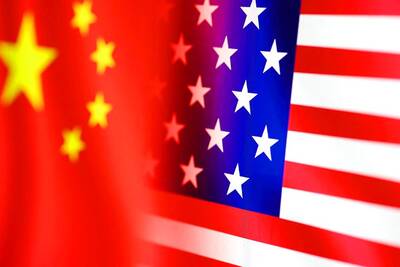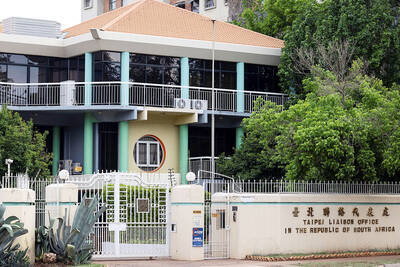Clashes broke out in the legislature yesterday as ruling party and opposition lawmakers pushed and shoved to take over the podium during a plenary meeting of the extra legislative session.
A male lawmaker complained of being bitten by a female colleague, while another female lawmaker screamed as she was frog-marched from the podium by a male opponent. Several legislators also had coffee sprayed on their faces during a scuffle.
The podium was first occupied by Chinese Nationalist Party (KMT) lawmakers, who were instructed by the party on Monday night to assemble outside the legislative chamber before 6:30am. When Democratic Progressive Party (DPP) and Taiwan Solidarity Union (TSU) lawmakers arrived soon after, fighting broke out.

Photo: CNA
Running out of the legislative hall in tears, KMT Legislator Wang Huei-mei (王惠美) told reporters she could not believe it when DPP Legislator Pasuya Yao (姚文智) grabbed her hands from behind and dragged her away from the podium.
“It’s the last day of the extra legislative session. What I was asking was that we should begin reviewing bills. Why did he attack a woman?” Wang asked.
Yao said he was trying to tell Wang not to jostle for space with DPP Legislator Hsu Chih-chieh (許智傑), who was already on the podium.
KMT Legislator Wu Yu-jen (吳育仁) showed reporters a bite mark on his upper left arm, accusing DPP Legislator Lin Shu-fen (林淑芬) of biting him when she rushed into the chamber and saw him standing on the podium.
“I didn’t feel pain at first, but it began to hurt an hour or two later. I think she bit me really hard,” Wu said.
Wu later posted a message on his Facebook page saying that he had taken a doctor’s advice and received a tetanus shot to prevent possible infection.
In response, Lin accused Wu of pressing his body against her and scratching her frantically.
“I bit him because he touched my breasts,” Lin said.
Lin apologized to DPP legislators Ho Hsin-chun (何欣純) and Hsueh Ling (薛凌) and to KMT Legislator Hsieh Kuo-liang (謝國樑) for accidentally spraying them with water and coffee during the confrontation. She refused to apologize to Wu.
“Why should I apologize to someone who touched my breasts?” Lin said.
Several DPP lawmakers also demanded that Wu apologize to Lin.
Later last night, Wu denied that he deliberately touched Lin’s breasts, but added that if she felt uncomfortable about the incident, he was willing to apologize.
KMT Legislator Ma Wen-Chun (馬文君) also wrestled with Lin in a separate clash.
In another round of fighting, DPP Legislator Chen Ting-fei (陳亭妃) was bundled into the back of KMT Legislator Chen Shu-hui (陳淑慧) and pulled out some of the latter’s hair.
KMT Legislator Huang Chao-shun (黃昭順) checked into a hospital, saying she injured her back after she was pushed to the ground and could barely stand up.
The KMT occupied the podium to ensure the passage of a number of controversial bills, while the DPP and the TSU staged a boycott to protest the signing of a cross-strait service trade agreement om Friday last week in Shanghai.
Lawmakers managed to reach a consensus on how to handle the controversial issues at 12:45pm, bringing the nearly six-hour long deadlock to an end.

Taiwan’s Lee Chia-hao (李佳豪) on Sunday won a silver medal at the All England Open Badminton Championships in Birmingham, England, a career best. Lee, 25, took silver in the final of the men’s singles against world No. 1 Shi Yuqi (石宇奇) of China, who won 21-17, 21-19 in a tough match that lasted 51 minutes. After the match, the Taiwanese player, who ranks No. 22 in the world, said it felt unreal to be challenging an opponent of Shi’s caliber. “I had to be in peak form, and constantly switch my rhythm and tactics in order to score points effectively,” he said. Lee got

‘CROWN JEWEL’: Washington ‘can delay and deter’ Chinese President Xi Jinping’s plans for Taiwan, but it is ‘a very delicate situation there,’ the secretary of state said US President Donald Trump is opposed to any change to Taiwan’s “status quo” by force or extortion and would maintain that policy, US Secretary of State Marco Rubio told the Hugh Hewitt Show host on Wednesday. The US’ policy is to maintain Taiwan’s “status quo” and to oppose any changes in the situation by force or extortion, Rubio said. Hewitt asked Rubio about the significance of Trump earlier this month speaking with Taiwan Semiconductor Manufacturing Co (台積電) chairman C.C. Wei (魏哲家) at the White House, a meeting that Hewitt described as a “big deal.” Asked whether the meeting was an indication of the

‘RELATIVELY STRONG LANGUAGE’: An expert said the state department has not softened its language on China and was ‘probably a little more Taiwan supportive’ China’s latest drills near Taiwan on Monday were “brazen and irresponsible threats,” a US Department of State spokesperson said on Tuesday, while reiterating Washington’s decades-long support of Taipei. “China cannot credibly claim to be a ‘force for stability in a turbulent world’ while issuing brazen and irresponsible threats toward Taiwan,” the unnamed spokesperson said in an e-mailed response to media queries. Washington’s enduring commitment to Taiwan will continue as it has for 45 years and the US “will continue to support Taiwan in the face of China’s military, economic, informational and diplomatic pressure campaign,” the e-mail said. “Alongside our international partners, we firmly

The Ministry of Foreign Affairs yesterday said it has lodged a protest with Pretoria after the name of the Taipei Liaison Office in South Africa was changed to the “Taipei Commercial Office” on the South African Department of International Relations and Cooperation’s (DIRCO) Web site. In October last year, the South African government asked Taiwan to relocate the Taipei Liaison Office, the nation’s de facto embassy, out of Pretoria. It later agreed to continue negotiating through official channels, but in January asked that the office be relocated by the end of this month. As of the middle of last month, DIRCO’s Web